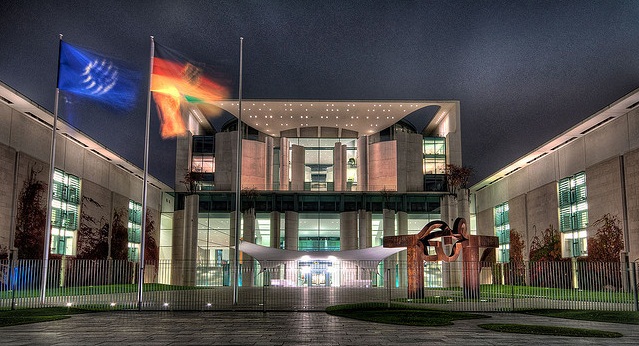Some days ago we reported on a press report basically saying that Munich has been dropped out of the hard fought race for the seat of the Central Division of the future EU Unified Patent Court:
[...] Munich seems to be out of the running, Paris appears to be the favourite and London could win a few laurels.
Paris as the court location appears to be backed by the President of the EU Council, Herman Van Rompuy, while it is speculated that
[t]he smart money appears to be on Paris at the moment, but diplomats warn that it’s still anyone’s guess whether a deal will be reached.
Now, on the eve of the decisive EU Summit, another article clarifies that Van Rompuy’s compromise plan, being the “result of consultation with the most concerned member states”, in fact proposes to share the location of the court between Paris, London and Munich. According to this plan, the official seat of the court’s central division, its president’s office and registry will reside in Paris, while some departments will be based in London and in Munich:
Given the highly specialised nature and quality standards, we also propose to create specialised clusters in two sections of the UPC, one in London, the other in Munich, which will continue to deal with administrative matters.
As the wording ‘administrative matters’ appears to exclude – for now – that court chambers will be established in London or Munich, one may ask what kind of administrative support can be given by Munich and London if even the registry is bound for Paris.
However, even though all these rumours cetrainly have a core of truth, it is also true that the race will not be decided by ‘smart money’ but by the EU Heads of Government on the EU Summit on 28/29 June 2012. It is further true that the outcome will highly depend on and be strongly linked to the much more important negitiations as to how the EU depth crisis can be effectively tackled. And this central issue will be dominated by the antagonism between the EU leaders who dramtically proposed a ‘Grand Plan‘ (pdf here) to safe the eurozone and Federal Chancellor Angela Merkel, who is prepared to rule out eurobonds “as long as I live“. Hence, there remains plenty of room for discussion and compromise – also on the seat issue.
(Photo 2009 by El Brown via Flickr under a CC license)
To answer the above question right away, I do not hope so because otherwise the future of the European Community/Union, the great idealistic and visionary European project, would lie in ruins already. As a patent professional and keen enthusiast of the European idea, please allow me to share some personal comments based on the findings of my earlier posting on the Deficiencies of the EU Legislative Process for Implementing a Unified Patent Infrastructure, namely
- ignorance as to users and experts and their (mostly) well-founded observations;
- a striking lack of transparency preventing public involvement;
- an information policy that disguises more than it discloses; and
- national egoisms, inappropriate horse-trading and power games.
As already expressed earlier, I think that these frightening mechanisms and structural deficiencies of the European policy-making process may endanger stability and acceptance of and confidence in the European Union as a whole. As none of those features is adequate for a democratic legislation process in a cooperating Europe, the conclusion might be that Europe’s democracy is in danger. This, apparently, is at least the opinion of Mr Martin Schultz, President of the European Parliament, who recently demanded that a “restart” of European democracy is required, as “the Union must make the decision-making process more transparent so that a genuine European public sphere can emerge”. Well roared, lion!
In one of our latest postings on the legal and political shadows of the Unified Patent Court Agreement we concluded that the stuck ‘seat issue’ will now have to be decided on the top executive level, i.e. in personal talks between Federal Chancellor Angela Merkel, Prime Minister David Cameron, and - should he survive the French presidential election in April/May 2012 - Nicolas Sarkozy as the only serious and realistic bits were Berlin, London, and Paris, respectively.
While the German government always claimed the seat of a European Patent Court, should such court ever exist, London became a candidate rather late and only after intervention of the UK legal profession and Paris was considered a compromise location to prevent a deadlock between Munich and London. None of these bits is ideal for everyone as each has considerable drawbacks, as has been recently summarised on FT.com “few other EU countries are happy with a Munich seat because the city is already the home to EPO“, “Britain lacks goodwill or allies“, and “French inflexibility has been damaging“.

Absent of any reliable source the tea leaves give some cryptic clues: Munich on schedule, London delayed, Paris vanished?
The story so far. As we all know, the talks on the new EU-wide patent infrastructure (consisting basically of the Unitary Patent Regulation and the Unified Patent Court Agreement) run aground in late December despite quite some rounds of negotiations producing encouraging press releases according to which the so called ‘EU Patent Package’ was considered “broadly accepted in substance”. However, at the end of the Polish EU Presidency‘s half-year term, the adoption of the “Warsaw Patent Convention” – a term coined by Polish Deputy Prime Minister Pawlak – could not be celebrated as expected due to ongoing dissension.
Even though it was spread after the failed Competitiveness Council of December 5/6 through semi-official channels (e.g. tweets and press report) that the whole deal was almost done and only the seat of the central division of the Unified Patent Court remained to be decided, real doubts and harsh criticism almost immediately occurred and stakeholders saw an opportunity to again open the discussion on various substantive legal issues (see e.g. EPLAW resolution, FICPI position paper), such as on Articles 6 to 9 of the Regulation (effects of patents) that require substantive patent law to be subject to review by the CJEU.
Despite ongoing controversies and criticism (“desaster“, “bound to fail“) as to substantive issues, the politicians declared the dice cast for the Unitary Patent so that the Regulation was not unwrapped again for negotiations as to the legal merits. In fact, the Regulation for the Unitary Patent meanwhile got a green light from the powerful legal committee (JURI) of the EU Parliament in late December and the EU Council began to linguistically finalise the Regulation text in early January.
The k/s/n/h::law blog
Some of the patent attorneys of the KSNH law firm have joined their efforts to research what is going on in the various branches of IP law and practice in order to keep themselves, their clients as well as interested circles of the public up to date. This blog is intended to present results of such efforts to a wider public.
Blog Archives
- November 2013 (2)
- October 2013 (1)
- September 2013 (1)
- August 2013 (2)
- July 2013 (3)
- June 2013 (5)
- March 2013 (5)
- February 2013 (4)
- January 2013 (5)
- December 2012 (5)
- November 2012 (5)
- July 2012 (5)
- June 2012 (8)
- May 2012 (5)
- April 2012 (3)
- March 2012 (4)
- February 2012 (5)
- January 2012 (6)
- December 2011 (12)
- November 2011 (9)
- October 2011 (9)
- September 2011 (4)
- August 2011 (7)
- July 2011 (4)
- June 2011 (1)
Blog Categories
- business methods (6)
- EPC (7)
- EPO (12)
- EU law (92)
- ACTA (8)
- CJEU (4)
- Comitology (1)
- competition law (2)
- Enforcement (6)
- EU Unified Patent Court (62)
- FTA India (1)
- TFEU (2)
- Trade Marks (5)
- European Patent Law (37)
- German Patent ACt (PatG) (1)
- German patent law (5)
- Germany (6)
- Pirate Party (3)
- International Patent Law (4)
- PCT (2)
- IP politics (10)
- licenses (2)
- Litigation (5)
- Patentability (7)
- Patents (12)
- Piratenpartei (2)
- Software inventions (10)
- Uncategorized (9)
- Unitary Patent (24)
- US Patent Law (4)
Comments
- kelle on Germany: Copyright Protection More Easily Available For Works Of “Applied Arts”
- Time Limits & Deadlines in Draft UPCA RoP: Counting The Days - KSNH Law - Intangible.Me on Wiki Edition of Agreement on Unified Patent Court Agreement (UPCA)
- Time Limits & Deadlines in Draft UPCA RoP: Counting The Days | ksnh::law on Wiki Edition of Agreement on Unified Patent Court Agreement (UPCA)
- Wiki Edition of Agreement on Unified Patent Cou... on Wiki Edition of Agreement on Unified Patent Court Agreement (UPCA)
- European Commission Takes Next Step Towards Legalising Software Patents in Europe | Techrights on EU Commission publishes Proposal of amendend Brussels I Regulation for ensuring Enforcement of UPC Judgements
Blogroll
- 12:01 Tuesday
- America-Israel Patent Law
- Anticipate This!
- AwakenIP
- BlawgIT
- BLOG@IPJUR.COM
- BP/G Radio Intellectual Property Podcast
- Broken Symmetry
- Class 46
- Director's Forum: David Kappos' Public Blog
- Gray on Claims
- I/P UPDATES
- IAM Magazine Blog
- Intellectual Property Intelligence Blog
- IP Asset Maximizer Blog
- IP CloseUp
- IP Dragon
- IP Watch
- IP Watchdog
- IPBIZ
- ipeg
- IPKat
- ITC 337 Law Blog
- Just a Patent Examiner
- K's Law
- MISSION INTANGIBLE
- Patent Baristas
- Patent Circle
- Patent Docs
- Patently Rubbish
- PatentlyO
- Patents Post-Grant
- Reexamination Alert
- SPICY IP
- Tangible IP
- The 271 Patent Blog
- The Intangible Economy
- THE INVENT BLOG®
- Think IP Strategy
- Tufty the Cat
- Visae Patentes
The KSNH blogging landscape


This blog and the German-language sister blog k/s/n/h::jur link to the two popular and privately run blogs IPJur und VisaePatentes and continue their work and mission with a widened scope and under the aegis of our IP law firm.
ksnhlaw on Twitter
- No public Twitter messages.
 KSNH::JUR Feed (german)
KSNH::JUR Feed (german)- Ist Verschlüsselung passé? September 6, 2013Auf verschiedenen Feldern beruflicher Praxis ist dafür zu sorgen, dass Kommunikation vertraulich bleibt. Die trifft beispielsweise für Ärzte zu, aber auch für Anwälte, darunter auch Patentanwälte. Einer der zahlreichen Aspekte, die in diesem Zusammenhang eine Rolle spielen, ist die Technik, um die Vertraulichkeit beruflicher Kommunikation sicherzustellen. Wa […]
- EU-Einheitspatent: Demonstrativer Optimismus und Zahlenmystik allerorten – Naivität oder politische Beeinflussung? June 26, 2013Nach mehreren vergeblichen Anläufen zur Schaffung eines EU-weiten Patentsystems wurde 1973 als Kompromiss das Europäische Patentübereinkommen unterzeichnet, welches unabhängig von der seinerzeit noch EWG genannten Europäischen Union System zur zentralisierten Patenterteilung mit nachgeordnetem Einspruchsverfahren durch das Europäische Patentamt schuf. Wie wi […]
- Moderne Zeiten oder: DPMA und Patentgericht streiten über die elektronische Akte April 25, 2013Bekanntlich hat das Deutsche Patent- und Markenamt (DPMA) im Jahre 2013 mit der rein technischen Fertigstellung der Einrichtungen zur elektronischen Akteneinsicht einen wichtigen Meilenstein seines Überganges von der Papierakte zur “elektronischen Akte” erreicht. Im DPMA werden aber bereits seit dem 01. Juni 2011 Patente, Gebrauchsmuster, Topografien und erg […]
- Gutachten zu Forschung, Innovation und technologischer Leistungsfähigkeit Deutschlands 2013 March 11, 2013Unter dem Datum vom 28. Februar 2013 ist die Bundestags-Drucksache 17/12611 veröffentlicht worden Sie trägt den Titel Unterrichtung durch die Bundesregierung - Gutachten zu Forschung, Innovation und technologischer Leistungsfähigkeit Deutschlands 2013. Die Bundesregierung legt dem Deutschen Bundestag seit dem Jahr 2008 […]
- 3D-Printing: Zum Filesharing von 3D-Modelldaten February 25, 2013In meiner kleinen zuvor angekündigten Reihe über rechtliche Aspekte des 3D Printing komme ich heute auf die Frage zu sprechen, ob die Hersteller von Gerätschaften es hinnehmen müssen, wenn Ersatztreile davon – vom Brillengestell über Smartphone-Gehäuseteile bis hin zu Rastenmähermotor-Abdeckungen – gescannt und die daraus […]
- Ist Verschlüsselung passé? September 6, 2013







